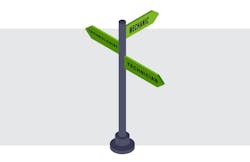I’ve been monitoring a number of industry chat rooms (do they still call them chat rooms?) in order to remain aware of what’s going on in the industry. They keep me current and allow me to continue my love affair with our industry. While wandering through one of my favorites, Scott Brown’s Diagnostic Network, I came across a post written by Jorge Menchu, someone for whom I have the utmost respect.
The post opened an old wound: the identity crisis our industry has suffered since I first entered the trade in 1966. It’s a crisis that leaves all of us wondering who we are and what to call ourselves.
The post suggested that while we know what it takes to be a professional automotive repair technician, it queried whether or not the term technician carried enough weight “to imply/describe those who dedicate their life to mastering the science, engineering and diagnostics of the automobile.” He wondered if changing how we refer to ourselves could, in some way, improve our circumstance or standing in some heretofore unknown way.
I have written about this before. The column was triggered by a visit to X-ray imaging center. I was intrigued by three certificates hanging on the wall that identified the X-ray technicians as ‘technologists.’ I was absolutely fascinated with the distinction and asked the technologist helping me what distinguished a technologist from a technician. He insisted there was a significant difference in education and training.
Even though my trip to the imaging center and the column that followed occurred more years ago than I care to remember, it appears it is no less relevant today. We are trapped in an endless loop of identity confusion that has some of us constantly wondering what we can do to convince those we serve that the very essence of what we do has so dramatically changed and others completely unaware of just how important a change in the perception of the motoring public could be and/or what it could mean.
Are we looking at an industry that has evolved into three distinct and easily definable tiers: mechanic, technician and technologist, where mechanics are involved in mechanical repairs, parts replacement and maintenance; technicians are involved in a “to be defined” mid-level of light diagnostics and component replacement; and, technologists find themselves involved almost exclusively in high-level diagnostics?
Let’s take a moment to see how these terms are defined. The dictionary defines a mechanic as: a person who repairs and maintains machinery. When I first started in this industry, I worked diligently to become the best mechanic I could become.
A technician is defined as a person skilled in the details or techniques of a subject, art, or profession. As the industry shifted and a new level of technology began to appear in the middle to late ’70s, I shifted with it, trying to ride the transition from points to electronic ignition, from electronic ignition to computerized engine controls and emissions.
And, a technologist is defined as an expert in a particular field of technology. Wikipedia takes that definition one step further (closer to what a technologist is likely to do in our arena) using an electrical technologist as an example, and defining it as follows: “an electrical technologist, as a person whose knowledge lies between that of an electrical engineer and an electrical tradesperson and an engineering technologist, as a specialist who implements technology within a field of engineering.”
In an interesting post entitled “Who Is A Technologist” by Charles Eaton that appeared in Creating IT Futures, the author suggested that technologists are likely to have these five things in common: they are likely to think strategically; they are curious and are fixated on solving problems; they see technology as a tool to serve others; they believe that technology exists to serve the public for whom it was designed; and, finally, that technologists value collaboration, cooperation and respect.
How many of you reading this see yourselves within the context of these definitions?
But, none of this matters—none of it! Not unless, or until, we find a way to communicate this shift to those among us who haven’t a clue anything has changed. Not unless, or until, we achieve some sort of consensus within the repair community that these three distinctions are real and carry with them the rewards and responsibilities of each of these three tiers. And, perhaps most importantly, not unless or until we are able—as a cohesive community of professionals—to convince the motoring public of the changes that have occurred in our industry and how we, as a repair community, have evolved with them.
Until that happens, we will never achieve the respect or reward we deserve for the sacrifice and effort it takes to achieve proficiency in any or all of these three tiers. We need to join together. We need to establish a working definition of what each of these three levels of performance is all about. We need to establish a professional standard for what it is we do. And, we need to communicate all of that with one strong unified voice.
Unless, or until, that happens, it’s all rhetoric. And, we will find ourselves endlessly involved in the same circular discussion.
About the Author

Mitch Schneider
Mitch Schneider is a fourth-generation auto repair professional and the former owner of Schneider’s Auto Repair in Simi Valley, Calif. He is an industry educator, seminar facilitator, blogger, and author of the acclaimed novel Misfire.
